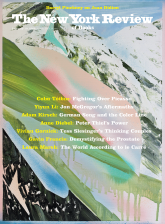In response to:
The Horrors of the Diamond Boom from the November 18, 2021 issue
To the Editors:
Joshua Hammer’s otherwise highly readable review of Steven Press’s Blood and Diamonds: Germany’s Imperial Ambitions in Africa [NYR, November 18, 2021] perpetuated some misconceptions about the role of Africans in the history of Namibia and of colonialism more generally.
Regarding Nama chief Josef Frederiks, Hammer notes that his “European name was probably bestowed on him by a missionary from the Rhenish Mission Society,” implying that Frederiks might have been as oblivious to the implications of baptism as to the difference between German and British miles. In fact, leaders such as Frederiks embraced Protestant Christianity early on and used Christian names in their interactions with whites because the latter found Khoekhoegowab names difficult to pronounce. This by no means meant that their adoption of the Christian faith was disingenuous or somehow incomplete, as the case of prominent devout Christians such as Chief Hendrik Witbooi illustrates.
Regarding the genocide of Herero and Nama, Hammer also erroneously casts the Battle of Waterberg as an unequal confrontation between machine-gun-wielding Germans and hapless Herero. As Matthias Häussler has recently demonstrated, the battle ended in a draw because Herero troops successfully resisted the German attempt to encircle them. While the Herero initiated a strategic retreat, it was disappointment and anger about the failure of encirclement, rather than an inherent logic of German ways of war, that led to the radicalization of General Lothar von Trotha’s strategy, culminating in the extermination order and the genocide. Unfortunately, Press does not cite Häussler, even though the German edition of his study appeared in 2018.*
Press and Hammer rightly emphasize the pervasive and abject violence of German rule, but it would be misleading to cast the peoples of Namibia as mere passive victims in their own history. In this respect, it seems that comparisons of the diamond fields with the rubber boom in the Congo or the South West African concentration camps serve less of an analytic purpose and more as a gesture toward enduring Conradian sensibilities that remain preoccupied with “the horror! The horror!”
Fabian Krautwald
New York City
Joshua Hammer replies:
Fabian Krautwald is correct when he says that Josef Frederiks’s Western name was likely his own choice. The phrasing in the piece suggests a lack of agency on his part, which wasn’t my intention. Similarly, as Krautwald writes, it was German military carelessness and error, not a deliberate plan, that led to the escape of Herero defenders through a gap in German lines. However, the victory that the Germans failed to attain at Waterberg was achieved even more horrifically by driving the Herero into the desert and blocking water holes. The Herero weren’t passive victims, but historians do often cast the German campaign as a precursor to the Holocaust.
This Issue
February 10, 2022
Our Lady of Deadpan
Picasso’s Obsessions
In the Beforemath
- Matthias Häussler, Der Genozid an den Herero: Krieg, Emotion und extreme Gewalt in Deutsch-Südwestafrika (Weilerswist: Velbrück Wissenschaft, 2018); translated into English by Elizabeth Janik as The Herero Genocide: War, Emotion, and Extreme Violence in Colonial Namibia (Berghan, 2021). See especially p. 14, fn 89.



